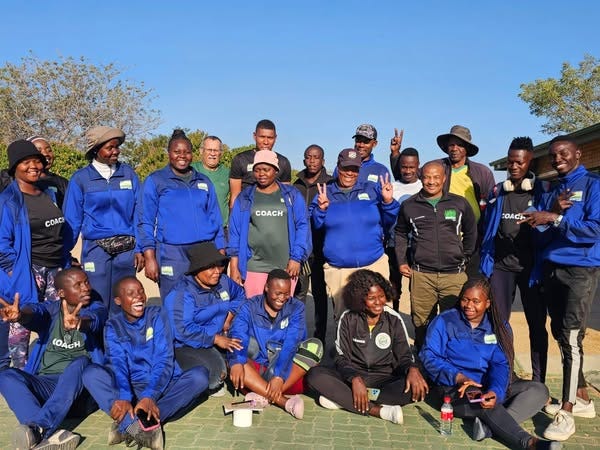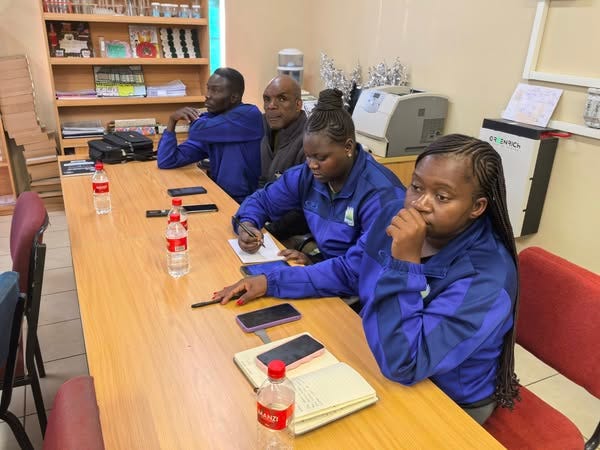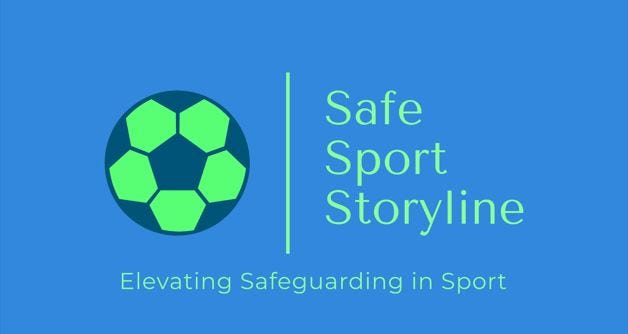Safe Sport Storyline #26
Convicted Hockey Coach Returns to South Africa, Need for International Sports Federations to Maintain a Register of Disbarred Coaches, plus Safeguarding Resources and News.
Hockey Coach convicted of a child sex crime back in South Africa
A South African hockey coach has been deported from the United States following a sex crime conviction, is now facing new allegations from former players he coached as teenagers in KwaZulu-Natal.
Brett Clay (40) was found guilty earlier this year in the USA of engaging in sexually explicit communication with a minor. The former Mount Olive field hockey coach, who lived in Flemington, New Jersey, reportedly sent inappropriate text messages to a 17-year-old girl, which escalated into him allegedly offering her money for explicit photos.
Clay was arrested in April 2024. He made bail and pled guilty in December 2024 to charges of endangering the welfare of a child. In February, a US Judge Robert J. Wilson ruled that Clay posed ‘an endangerment to children’, barred him from working with minors, and ordered him to leave the country after his visa expired.
During the hearing Clay stated “I regret my actions. Stupidity is the best I can put it down to. And I don’t play victim in anything that I’ve lost in terms of reputation, career. All of that. I accept that I give it up. I’m just looking forward to getting home and moving and, also, hoping that gives the victim and the family less anxiety of me still being here.”
He was sentenced to three years of probation, but because his work Visa ran out during his arrest, he is no longer compliant with federal law, his attorney said. Clay agreed to leave the country, return to South Africa, where he is from, and to never work with or coach minors under the age of 18 in New Jersey.
Wilson ordered Clay to comply with a psycho-sexual evaluation, receive treatment, register on the New Jersey Megan’s Law Sex Offender Internet Registry list, and fulfil a DNA sampling prior to his departure.
Clay was accused in early 2024, by one of his former female field hockey players, of inappropriately text messaging her.
The field hockey player’s parents discovered messages sent between Clay and their daughter in 2024. When the athlete was questioned about them, she said they had been texting for years. They then went to the authorities.
Due to the graphic nature of the messages, Clay was arrested.
Throughout the 256 pages of their thread of messages, authorities discovered that Clay persistently asked the athlete to share with him either non-explicit or explicitly detailed sexual stories, Wilson said. Clay had even told the athlete that he had “developed a plan for them to be together in the future.”
Read the full story here.
Players Come Forward in South Africa
On Brett Clay’s return to South Africa some of his former players, now adult women, have come forward to say his predatory behaviour began long before his stint abroad.
One of those women, who reached out to the South African Hockey Association (SAHA), said she was only 13 when Clay allegedly started grooming her. In her message to the hockey body, she revealed that she and several other girls chose to remain silent at the time out of fear.
‘He should not be allowed to coach here,’ she wrote. ‘I don’t want anyone else to go through what he did to me.’
She also accused Clay of exploiting ‘many adolescent girls’ during his coaching years in KwaZulu-Natal before moving to the United States.
SAHA has since issued an urgent warning to clubs, schools, and sports associations across the country, urging them to refuse any affiliation with Clay and to report any known activity involving him in the hockey environment.
Gary Dolley, SAHA’s senior safeguarding officer, confirmed the association was alerted to Clay’s conviction and had taken steps to protect players.
‘All our affiliates have been informed about the potential risk. We strongly advise that no organisation engages his services,’ Dolley said. ‘SAHA remains committed to ensuring a safe space for all players, and that includes taking decisive action against individuals who pose a threat.’
Clay’s coaching credentials, once respected, are now under severe scrutiny both locally and internationally. There may yet be criminal charges linked if the formers players who have come forward decide to open a case of child sexual abuse against him. If they do the SAHA should offer the players support.
There is also a question of how the International Hockey Federation, USA Field Hockey and SAHA proceed with disciplinary action based on the risk to young hockey players identified in Judge Wilson’s findings. Any possibility of Clay returning to coach minors in sport needs to be addressed.
Read more of this story here.
Check out this YouTube Video with a twist in the tale.
Improvement in SAHA Safeguarding Response
South African hockey has previously dealt with coaches convicted of sexual offences against minors in other countries. In 2019, concerns arose about a coach on the UK’s Sexual Offenders Register working in South Africa.
Graham Hawkins, then 57, was sentenced in the UK to 30 months in prison in July 2012 after admitting to eight counts of historical indecent assault against a 15-year-old. He was added to the UK's Sexual Offenders Register for ten years and banned from working with children. Despite this, Hawkins later coached children aged 5–13 at the Khosa Mini Hockey club in South Africa.
The Club Chairman, a friend of Hawkins, stated that Hawkins has coached other clubs and a school in South Africa, all of which knew his background.
This situation raises concerns about vetting, as schools and sports clubs hired someone banned from working with children abroad. The justification is that the offence was long ago, and Hawkins was young, but these are factors likely considered during his UK sentencing and he was disbarred from working with minors.
He served jail time for his crime, was placed on the Sexual Offenders Register for ten years and is disbarred from working with children in the UK—facts that should have prompted SAHA to see him as a risk in South Africa. The lack of restrictions for those disbarred abroad indicates a national systemic failure. However, SAHA's recent warning about Brett Clay shows that safeguarding in South African Hockey has improved since 2019.
Need for International Sports Federations to Maintain a Register of Disbarred Coaches
Sharing outcomes of criminal prosecutions and disciplinary hearings can be complex due to variations in privacy and data protection laws. As coaches often work across borders, there is an operational need for international and national sports federations to exchange information regarding coaches who have been disbarred—whether through the criminal justice system or disciplinary action—if they are identified as posing risks to minors or vulnerable individuals.
The international development and humanitarian sectors encounter similar challenges; specifically, preventing individuals found responsible for sexual exploitation, abuse, or harassment from moving between organisations undetected.
One initiative addressing these concerns in the development and humanitarian sectors is the Misconduct Disclosure Scheme (MDS), coordinated by the Inter-Agency Standing Committee (IASC) and managed by the Steering Committee for Humanitarian Response (SCHR). Major organisations such as UNICEF, UNHCR, Oxfam, and Save the Children participate in this scheme, which is designed to prevent individuals found guilty of sexual exploitation, abuse, or harassment from being rehired undetected by other organisations.
Challenges exist when sharing information between organisations under initiatives like the Misconduct Disclosure Scheme (MDS) and other similar efforts aimed at preventing re-employment of individuals dismissed due to sexual misconduct or safeguarding violations. These challenges include:
Privacy laws and data protection regulations (for example, GDPR in Europe), which may limit the sharing of personal or disciplinary information, even with consent.
Variability in national laws, making global harmonisation difficult.
Concerns about legal liability (such as defamation or wrongful dismissal claims) if shared information is inaccurate or insufficiently substantiated.
Notwithstanding these legal and data protection considerations, there is ongoing discussion regarding the role of international sports federations in maintaining a register of persons prohibited from working with children and vulnerable adults in their sport, aiming to address concerns related to movement between jurisdictions and safeguarding risks.
RESOURCES
Where Safety Meets Science - Dr. Tine Vertommen
A renowned expert in safeguarding and preventing violence in sports, with a strong academic and consulting background. Dr. Tine Vertommen leads the Safeguarding Sport and Society research team at Thomas More University of Applied Sciences in Belgium and serves as a visiting professor at Ghent University. Dr. Vertommen is also a trusted external expert for the Safe Sport Unit at the International Olympic Committee (IOC), where she collaborates on developing evidence-based policies and tools to ensure safer sports environments worldwide.
Her website features a page of useful resources on safeguarding in sport including videos, tools , scientific papers and more.
Access her website here.
It’s a Penalty UEFA Women’s EURO2025 Human Trafficking Campaign
How do Children Disclose Abuse?
John Cardamone, a Survivor of Child Sexual Abuse and a Disclosure Response Specialist has produced this poster that asks do children disclose sexual abuse verbally? Most of the time they don’t. It took me two years to disclose the sexual abuse I was going through.
Children disclose through their actions and behaviour, all forms of behaviour is communication. Especially for children we can’t assume they will just “tell” us. We need to know what the signs are.
This easy to read one page poster looks at the signs of behaviour to look for; how you can support children in your care; and what you can do to prevent abuse.
Coping With Abuse - Child Referees in Football: Is It All Just Part of the Job?
Following identification of child abuse embedded in sports, there has been a significant increase in research exploring the culture of sport and how this might be challenged to enable children's voices and support safeguarding. This has, however, focused largely on the experience of youth players with the place of youth officials significantly neglected in this context. This paper explores the experiences of youth referees through three English county FA case studies utilising a Foucauldian Discourse Analysis of interviews with U18 officials, and adults working with them (Referee Development Officers, Referee Mentors, Youth Representative, Allocation Officer and parents).
Read this research paper by Suzanne Everley here.
NEWS
New report demands independent bodies to tackle sports violence against women
Further coverage of the new study by the Aga Khan University that found that 60 per cent of female athletes in East Africa experience GBV, with Kenya leading at 70 per cent. The violence causes emotional trauma, poor performance, and forces many women to withdraw from sports entirely, perpetuating male dominance in the sector.
Read this article here.
Safeguarding Training for Young Cricketers in Lesotho
Last week, Nthona Tsoanyane, the Lesotho Olympic Committee’s Safeguarding and Projects Officer, facilitated a Safe Sport session for cricket athletes aged 11–16 from several schools and districts at the Anglican Centre.
Discussions focused on two crucial pillars of athlete welfare:
Anti-Doping Awareness
Safeguarding in Sport
Tsoanyane stated as a Safeguarding Officer, it is my duty but more so, my passion to ensure that young athletes are informed, empowered, and protected. The young players learned:
Their rights in safeguarding and anti-doping
When and how to report a concern
That safeguarding is not just for adults to uphold, they too play a role in keeping themselves and their peers safe
That competing clean is a mark of true excellence.
The session closed the session with a powerful Athlete Oath, committing to uphold integrity, safety, and fairness in sport. This is what building a safe, inclusive, and value-driven sporting culture looks like from the ground up.
CAF Publish Results of Nutrition Survey of Youth Players
During the African Schools Football Championship, the Confederation of African Football (CAF) conducted a nutrition survey that reveals clear gaps in the dietary habits and nutritional knowledge of youth players.
The new IOC Consensus Statement on Safeguarding in Sport’s definition of safeguarding includes the promotion of holistic approaches to athlete welfare. Good nutrition is an important component of athlete welfare.
You can download this report here.
Caster Semenya calls for athletes’ rights to be put first as court rules in her favour
European Court for Human Rights rules South African runner did not have fair trial on need to lower testosterone levels to compete in women’s sport.
South African runner Caster Semenya has called for athletes’ rights to be better protected after Europe’s top human rights court ruled that she had not been given a fair trial when she contested a policy that required her to lower her testosterone levels in order to compete in women’s sport.
Read this news article here.
Dreamfields Project receive more Safeguarding Awareness and Safeguarding Facilitator training
Last week, Donny Jurgens, delivered additional Safeguarding Awareness and Safeguarding Facilitator training for the South Africa NGO called Dreamfields Project.


The Dreamfields Project is a non-profit that improves sports facilities and opportunities in rural and township schools, mainly by providing soccer equipment, building fields, and organizing competitions to support children's development and enjoyment of sport.
Donny Jurgens journey with Dreamfields started with Safeguarding Awareness training for coaches in George, Western Cape, followed by Safeguarding Facilitator training, then supporting some of the trained facilitators in conducting training. His latest assignment involved travelling to Limpopo and Mpumalanga, in South Africa, where Dreamfields is doing some amazing work, getting more children to play. This is an example of an organisation that is taking Safeguarding seriously.









